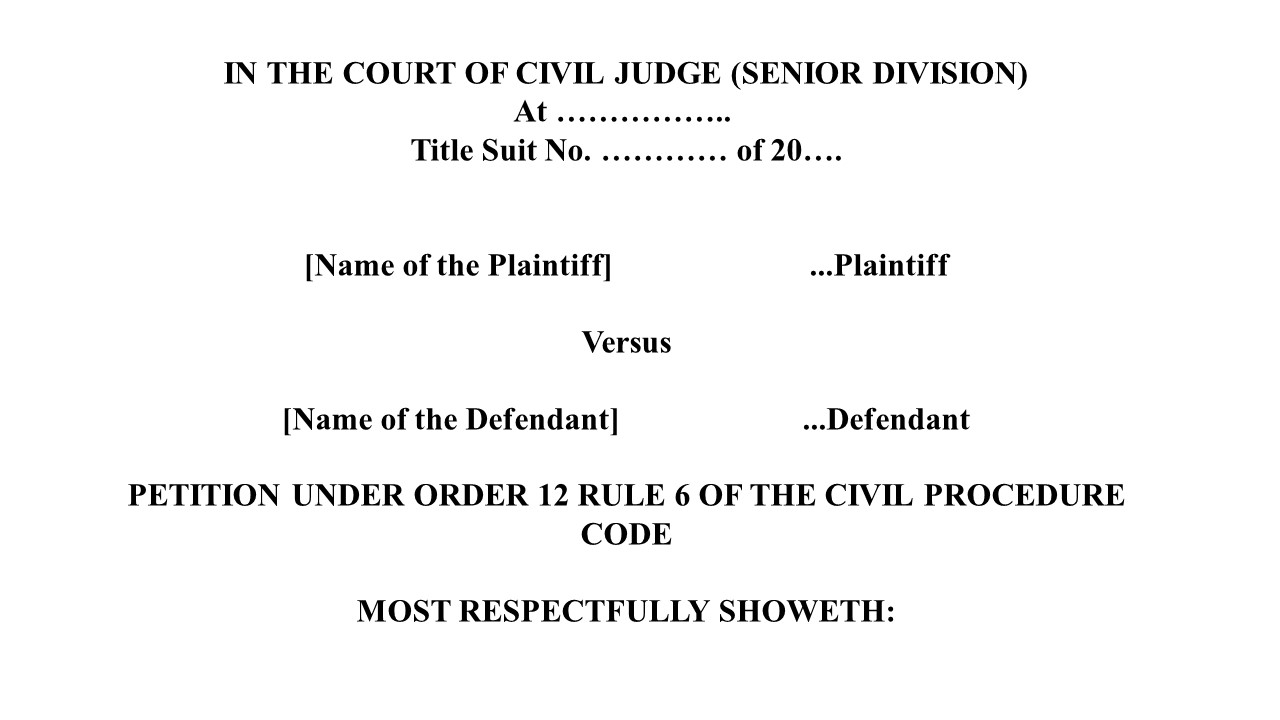Reviews
M.R.P. : ₹ 212.40
(Inclusive of all taxes)
Details
- This comprehensive legal template is designed for drafting a petition under Order 12 Rule 6 of the Civil Procedure Code (CPC), which provides for the judgment on admissions. This ready-to-use format ensures that legal practitioners and litigants can efficiently prepare their petition to seek a swift judgment based on the unequivocal admissions made by the opposing party.
Description
This comprehensive legal template is designed for drafting a petition under Order 12 Rule 6 of the Civil Procedure Code (CPC), which provides for the judgment on admissions. This ready-to-use format ensures that legal practitioners and litigants can efficiently prepare their petition to seek a swift judgment based on the unequivocal admissions made by the opposing party.
Understanding Order 12 Rule 6 CPC
Order 12 Rule 6 of the Civil Procedure Code (CPC) provides for the possibility of a judgment on admissions. This rule allows the court to pass a judgment based on admissions made by the parties, whether in the pleadings or otherwise, without the need for a full trial. This can expedite the resolution of cases where there is clear and unequivocal admission of facts that entitle the plaintiff to relief.
Here is the text of Order 12 Rule 6 of the CPC:
Order XII Rule 6: Judgment on Admissions
"6. Judgment on admissions.— (1) Where admissions of fact have been made either in the pleading or otherwise, whether orally or in writing, the court may at any stage of the suit, either on the application of any party or of its own motion and without waiting for the determination of any other question between the parties, make such order or give such judgment as it may think fit, having regard to such admissions.
(2) Whenever a judgment is pronounced under sub-rule (1), a decree shall be drawn up in accordance with the judgment and the decree shall bear the date on which the judgment was pronounced."
Key Points:
1. Admissions of Fact:The rule applies to admissions of fact made by a party either in the pleadings or otherwise, whether orally or in writing.
2. Court’s Discretion: The court has the discretion to pass a judgment or order based on these admissions at any stage of the suit, either on the application of any party or on its own motion.
3. Expedited Resolution:The rule allows for an expedited resolution of the case without waiting for the determination of other questions between the parties, thus saving time and resources.
4. Decree: Once a judgment is pronounced based on admissions, a decree will be drawn up in accordance with the judgment, bearing the date on which the judgment was pronounced.
Practical Application:
Order 12 Rule 6 CPC is particularly useful in situations where there are clear admissions by one party that could lead to a speedy resolution of the dispute. For example, in a money recovery suit, if the defendant has admitted the debt in their written statement, the plaintiff can move the court for a judgment based on that admission, potentially avoiding a lengthy trial process.
Example Scenarios:
- **Debt Recovery:** If a defendant admits owing a certain amount of money to the plaintiff, the court can pass a judgment based on this admission without going through a full trial.
- **Possession Cases:** If a defendant admits to the plaintiff's ownership or right to possession of a property, the court can grant a judgment for possession.
Benefits:
- **Time-Saving:** It reduces the time required to resolve disputes by avoiding unnecessary trials where facts are admitted.
- **Efficiency:** Enhances judicial efficiency by allowing the court to focus on disputed issues rather than those that are admitted.
Understanding and utilizing Order 12 Rule 6 CPC can be highly beneficial for legal practitioners and litigants seeking a swift resolution of their cases based on clear admissions by the opposing party.
